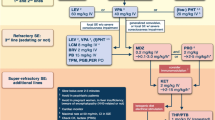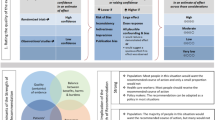Abstract
Background
To date, specialized studies focusing on status epilepticus (SE) in anti-N-methyl d-aspartate receptor (anti-NMDAR) encephalitis are limited, and the association between the occurrence of SE and clinical outcome is controversial. This study aims to investigate the differences between patients with critical anti-NMDAR encephalitis with SE and patients who experienced epileptic seizures without SE and to evaluate the long-term disease outcomes of patients with anti-NMDAR encephalitis with SE who were admitted to the neurological intensive care unit (neuro-ICU).
Methods
In this retrospective study based on a prospective registry, patients with anti-NMDAR encephalitis with neuro-ICU admission from 2014 to 2019 were analyzed and divided into two groups based on whether they had SE. Their clinical characteristics during the neuro-ICU stay were assessed and compared. The neurological and seizure outcomes were evaluated every 3 months.
Results
Of 83 patients with anti-NMDAR encephalitis, 24 required intensive care. In the SE group, 38.5% (5 of 13) of patients developed refractory SE (RSE), and 21.3% (3 of 13) of patients developed super RSE. More patients in the SE group presented with seizures as the initial symptoms (53.8% vs. 9.1%, p = 0.033) and had a strong positive NMDAR antibody titer in the cerebrospinal fluid (76.9% vs. 27.3%, p = 0.043). More patients in the non-SE group had a good neurological outcome (modified Rankin Scale (mRS) score < 2) at 3 months after disease onset (60.0% vs. 15.4%, p = 0.039), but 83.3% of patients with SE had a mRS score < 2 at 9 months after disease onset, which was similar to the rate in the non-SE group. A total of 41.7% of patients with SE had their last seizure within 1 month from disease onset, which was significantly lower than the rate in the non-SE group (90%), but all the patients with SE became seizure free after the acute phase of disease.
Conclusions
Patients with critical anti-NMDAR encephalitis who present with SE have a high rate of RSE/super RSE and recover more slowly than patients without SE, but most of them will eventually achieve good long-term neurological outcomes and live seizure free after the acute phase.



Similar content being viewed by others
References
Harutyunyan G, Hauer L, Dünser MW, et al. Risk factors for intensive care unit admission in patients with autoimmune encephalitis. Front Immunol. 2017;8:835.
Granerod J, Ambrose HE, Davies NW, et al. Causes of encephalitis and differences in their clinical presentations in England: a multicentre, population-based prospective study. Lancet Infect Dis. 2010;10(12):835–44.
De Montmollin E, Demeret S, Brulé N, et al. Anti-N-methyl-d-aspartate receptor encephalitis in adult patients requiring intensive care. Am J Respir Crit Care Med. 2017;195(4):491–9.
Gaspard N, Foreman BP, Alvarez V, et al. New-onset refractory status epilepticus: etiology, clinical features, and outcome. Neurology. 2015;85(18):1604–13.
Harutyunyan G, Hauer L, Dünser MW, et al. Autoimmune encephalitis at the neurological intensive care unit: etiologies, reasons for admission and survival. Neurocrit Care. 2016;27(1):82–9.
Dalmau J, Gleichman AJ, Hughes EG, et al. Anti-NMDA-receptor encephalitis: case series and analysis of the effects of antibodies. Lancet Neurol. 2008;7(12):1091–8.
Dalmau J, Lancaster E, Martinez-Hernandez E, et al. Clinical experience and laboratory investigations in patients with anti-NMDAR encephalitis. Lancet Neurol. 2011;10(1):63–74.
Chanson E, Bicilli É, Lauxerois M, et al. Anti-NMDA-R encephalitis: should we consider extreme delta brush as electrical status epilepticus? Clin Neurophysiol. 2016;46(1):17–25.
Liu X, Yan B, Wang R, et al. Seizure outcomes in patients with anti-NMDAR encephalitis: a follow-up study. Epilepsia. 2017;58(12):2104–11.
Titulaer MJ, McCracken L, Gabilondo I, et al. Treatment and prognostic factors for long-term outcome in patients with anti-NMDA receptor encephalitis: an observational cohort study. Lancet Neurol. 2013;12(2):157–65.
Shorvon S, Trinka E. Regulatory aspects of status epilepticus. Epilepsia. 2018;59:128–34.
Betjemann JP, Lowenstein DH. Status epilepticus in adults. Lancet Neurol. 2015;14(6):615–24.
Kuang-Lin L, Jann-Jim L. Neurocritical care for anti-NMDA receptor encephalitis. Biomed J. 2020;43:251–8.
Gofshteyn JS, Yeshokumar AK, Jette N, et al. Clinical and electrographic features of persistent seizures and status epilepticus associated with anti-NMDA receptor encephalitis (anti-NMDARE). Epileptic Disord. 2020;22:739–51.
Chi X, Wang W, Huang C, et al. Risk factors for mortality in patients with anti-NMDA receptor encephalitis. Acta Neurol Scand. 2017;136:298–304.
Graus F, Titulaer MJ, Balu R, et al. A clinical approach to diagnosis of autoimmune encephalitis. Lancet Neurol. 2016;15(4):391–404.
Trinka E, Cock H, Hesdorffer D, et al. A definition and classification of status epilepticus—report of the ILAE task force on classification of status epilepticus. Epilepsia. 2015;56(10):1515–23.
Arya R, Rotenberg A. Dietary, immunological, surgical, and other emerging treatments for pediatric refractory status epilepticus. Seizure. 2019;68:89–96.
Goselink RJM, van Dillen JJ, Aerts M, et al. The difficulty of diagnosing NCSE in clinical practice; external validation of the Salzburg criteria. Epilepsia. 2019;60(8):1–5.
Beniczky S, et al. Unified EEG terminology and criteria for nonconvulsive status epilepticus. Epilepsia. 2013;54(6):28–9.
Leitinger M, Beniczky S, Rohracher A, et al. Salzburg consensus criteria for non-convulsive status epilepticus-approach to clinical application. Epilepsy Behav. 2015;49:158–63.
Rossetti AO, Logroscino G, Milligan TA, et al. Status epilepticus severity score (STESS): a tool to orient early treatment strategy. J Neurol. 2008;255(10):1561–6.
Gao Q, Ou-Yang TP, Sun XL, et al. Prediction of functional outcome in patients with convulsive status epilepticus: the END-IT score. Crit Care. 2016;20(1):46.
Meierkord H, Boon P, Engelsen B, Gocke K, Shorvon S, Tinuper P, et al. EFNS guideline on the management of status epilepticus. Eur J Neurol. 2006;13:445–50.
Meierkord H, Boon P, Engelsen B, Gocke K, Shorvon S, Tinuper P, et al. EFNS guideline on the management of status epilepticus in adults. Eur J Neurol. 2010;17:348–55.
Neurocritical Care Group from Chinese Medical Association’s Neurology Chapter. Chinese expert consensus for monitoring and management of adult patients with convulsive status epilepticus. Chin J Neurol. 2014;47:661–6.
Yan Z, Gang L, Mengdi J, et al. Clinical characteristics and prognosis of severe anti-N-methyl-d-aspartate receptor encephalitis patients. Neurocrit Care. 2018;29:264–72.
Nuria GA, Maarten JT, Abiguei T, et al. Diagnosis and significance of antibody titers in anti-NMDA receptor encephalitis, a retrospective study. Lancet Neurol. 2014;13(2):167–77.
Xiuxiu L, Fang Y, Jingjing Z, et al. Long-term seizure outcome in patients with status epilepticus due to acute encephalitis. Seizure. 2019;69:70–5.
Dalmau J. NMDA receptor encephalitis and other antibody-mediated disorders of the synapse: the 2016 Cotzias lecture. Neurology. 2016;87(23):2471–82.
Acknowledgments
We thank all the staffs and patients who contributed to the study. In particular, we thank Dr. KH Chan (Associate Professor, Division of Neurology, Department of Medicine, Queen Mary Hospital, The University of Hong Kong) for his valuable advice about this research and English writing.
Funding
This study was supported by the Funding Key Research and Development Project of Shaanxi Province (No.2020SF-306).
Author information
Authors and Affiliations
Contributions
Fang Yang and Wen Jiang designed the study. Xuan Wang, Jian Wan, and Zihan Wei collected the data. Jian Wan, Xuan Wang and Xiaogang Kang analyzed the data. Zihan Wei and Changgeng Song revised the statistical analyses. Xuan Wang and Jian Wan wrote the paper. Fang Yang, Fang Du and Wan Jiang revised the paper. All the authors approve the final version of the manuscript.
Corresponding authors
Ethics declarations
Conflicts of Interest
The authors declare that they have no conflict of interest.
Ethical Approval
This study was approved by the Ethics Committee of Xijing Hospital, Fourth Military Medical University and was in compliance with the Helsinki Declaration.
Informed Consent
Informed consents for the current study were obtained from the patients or their guardians.
Additional information
Publisher's Note
Springer Nature remains neutral with regard to jurisdictional claims in published maps and institutional affiliations.
Supplementary Information
Below is the link to the electronic supplementary material.
Rights and permissions
About this article
Cite this article
Wang, X., Wan, J., Wei, Z. et al. Status Epilepticus in Patients with Anti-NMDAR Encephalitis Requiring Intensive Care: A Follow-Up Study. Neurocrit Care 36, 192–201 (2022). https://doi.org/10.1007/s12028-021-01283-4
Received:
Accepted:
Published:
Issue Date:
DOI: https://doi.org/10.1007/s12028-021-01283-4




